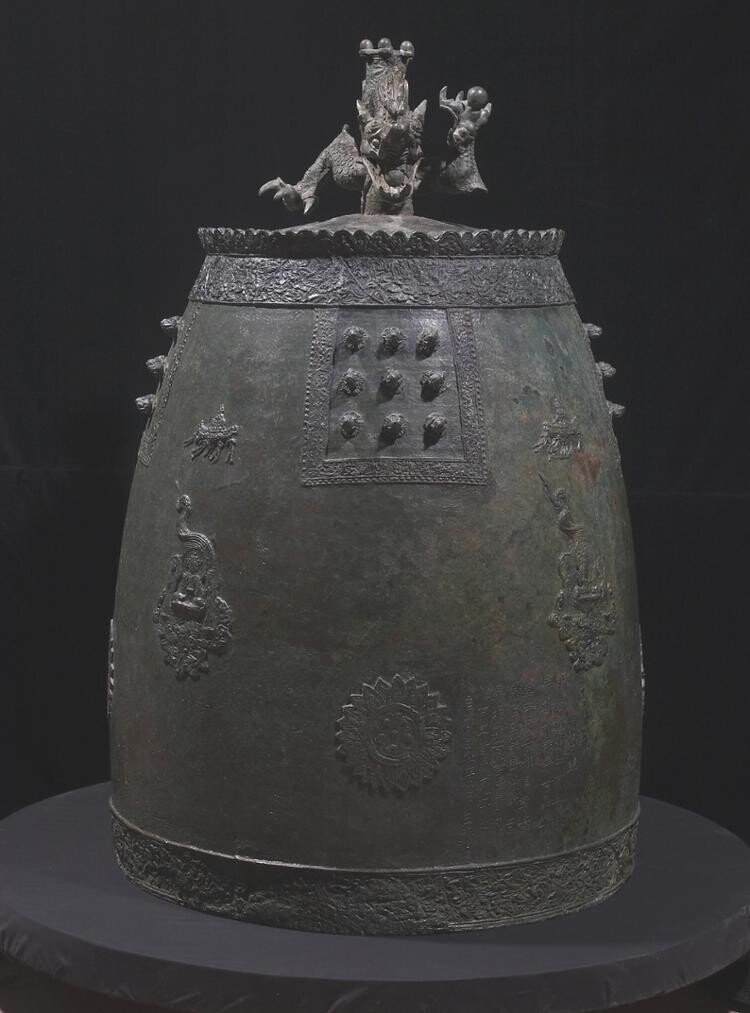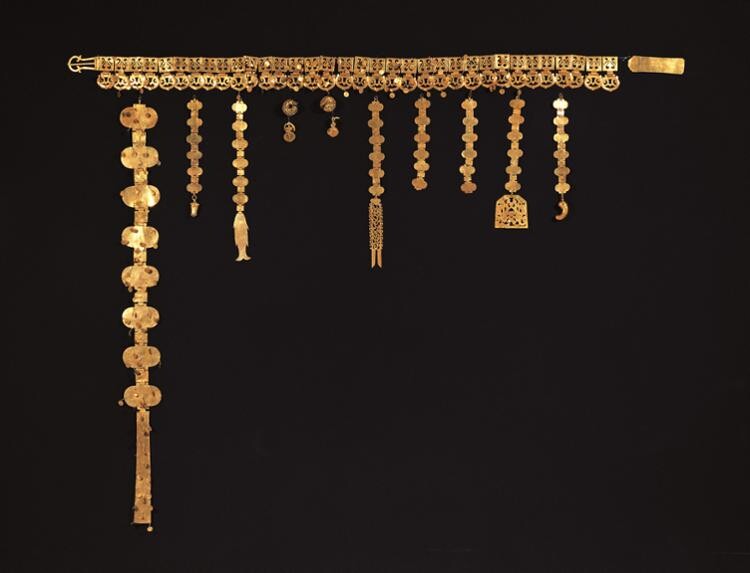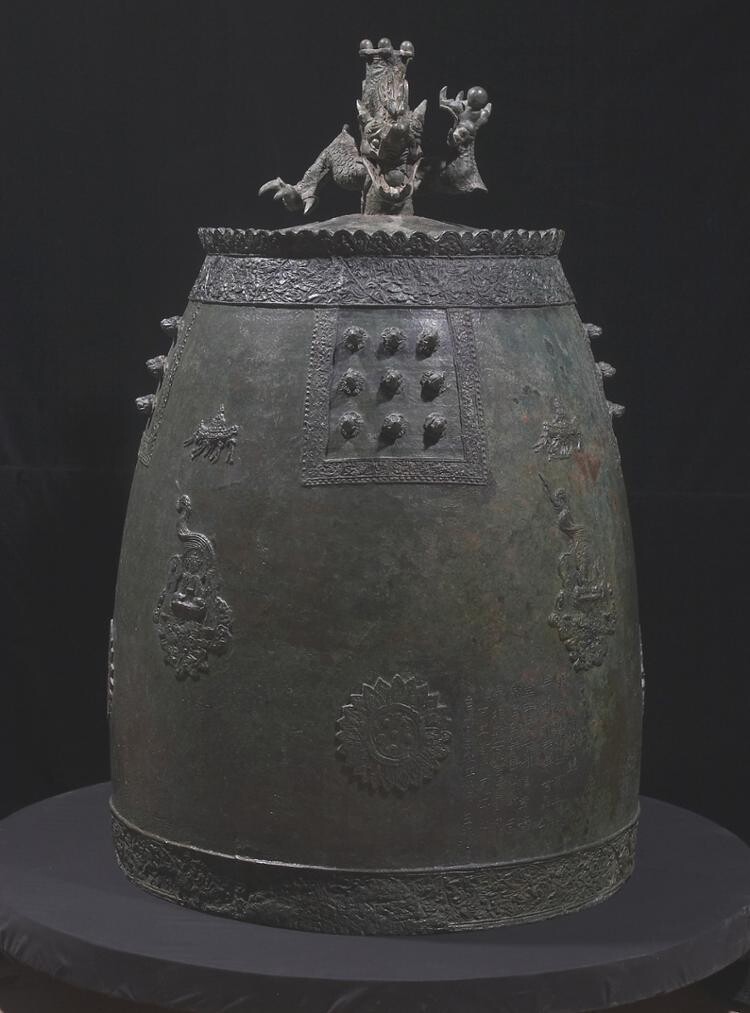Courtesy of CHA
The Cultural Heritage Administration (CHA) announced on Tuesday that an 800-year-old Buddhist bronze bell, located in Naeso Temple in Buan, North Jeolla Province, has been designated as a national treasure. Produced in 1222, the bell stands at a height of 103 centimeters and weighs approximately 420 kilograms, making it the largest among surviving bronze bells from the late Goryeo Kingdom (918-1392).
 |
| ▲ A late Goryeo-era Buddhist bronze bell housed in Naeso Temple in Buan, North Jeolla Province / Courtesy of CHA |
Originally housed in the now-gone Cheongnim Temple in South Chungcheong Province, the bell was relocated to Naeso Temple in 1850. Its elevation to national treasure status comes six decades after its initial designation as a treasure in 1963.
Considered a prime masterpiece, the bell showcases intricate Goryeo-era craftsmanship while inheriting technical and aesthetic traditions from the Unified Silla Kingdom (668-935). Notable features include a dynamically carved "yongnyu" (bell hanger) in the form of a dragon, lotus patterns on its shoulder and "dangjwa" (striking point), and bands of vines encircling the bell's crown and sound bow.
 |
| ▲ A Silla-era gold waistband excavated from Seobongchong Tomb in Gyeongju / Courtesy of CHA |
The CHA emphasized the relic's crucial role as a resource for researching the history and production techniques of Korean Buddhist bells, citing its explicit information on enshrinement location, commissioners, and craftsmen.
In addition to the bronze bell, the CHA designated five additional artifacts as treasures. These include two gold waistbands from the Silla period, discovered in Geumnyeongchong and Seobongchong Tombs in Gyeongju. Other designated treasures comprise a Goryeo-era celadon vessel with incised parrot patterns, a Joseon-era poetry anthology, and a wooden Buddhist statue from Seonchal Temple in Andong, North Gyeongsang Province.
Sayart
Joy, nunimbos@gmail.com
800-Year-Old Relic, Largest of Its Kind from Late Goryeo Kingdom, Recognized by Cultural Heritage Administration
Courtesy of CHA
The Cultural Heritage Administration (CHA) announced on Tuesday that an 800-year-old Buddhist bronze bell, located in Naeso Temple in Buan, North Jeolla Province, has been designated as a national treasure. Produced in 1222, the bell stands at a height of 103 centimeters and weighs approximately 420 kilograms, making it the largest among surviving bronze bells from the late Goryeo Kingdom (918-1392).
 |
| ▲ A late Goryeo-era Buddhist bronze bell housed in Naeso Temple in Buan, North Jeolla Province / Courtesy of CHA |
Originally housed in the now-gone Cheongnim Temple in South Chungcheong Province, the bell was relocated to Naeso Temple in 1850. Its elevation to national treasure status comes six decades after its initial designation as a treasure in 1963.
Considered a prime masterpiece, the bell showcases intricate Goryeo-era craftsmanship while inheriting technical and aesthetic traditions from the Unified Silla Kingdom (668-935). Notable features include a dynamically carved "yongnyu" (bell hanger) in the form of a dragon, lotus patterns on its shoulder and "dangjwa" (striking point), and bands of vines encircling the bell's crown and sound bow.
 |
| ▲ A Silla-era gold waistband excavated from Seobongchong Tomb in Gyeongju / Courtesy of CHA |
The CHA emphasized the relic's crucial role as a resource for researching the history and production techniques of Korean Buddhist bells, citing its explicit information on enshrinement location, commissioners, and craftsmen.
In addition to the bronze bell, the CHA designated five additional artifacts as treasures. These include two gold waistbands from the Silla period, discovered in Geumnyeongchong and Seobongchong Tombs in Gyeongju. Other designated treasures comprise a Goryeo-era celadon vessel with incised parrot patterns, a Joseon-era poetry anthology, and a wooden Buddhist statue from Seonchal Temple in Andong, North Gyeongsang Province.
Sayart
Joy, nunimbos@gmail.com
Related articles
- Naver Report Reveals Most Searched Television Programs and Movies in 2023
- Surge in Repatriation of South Korean Artifacts in 2023
- Culture Station Seoul 284 Hosts Inaugural Christmas Market
- Diverse Musicians Unite for Charity in "Sharing & Together Concert"

















